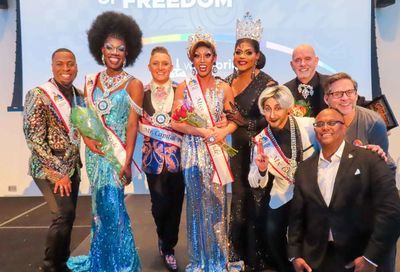More Than 30 LGBT, HIV/AIDS Orgs Call for National Immigration Reform in Wake of High Court Ruling
Today, the Supreme Court issued its ruling in the Obama administration’s challenge to Arizona’s immigration law, S.B. 1070, holding that three of the four provisions at issue were preempted by federal law and that the final provision — the “show your papers” provision — was not preempted by federal law but would need to be carefully implemented by the state in order to avoid being found unconstitutional in the future.
Today’s ruling sparked a strong statement from more than 30 LGBT and HIV/AIDS organizations noting specific challenges faced by LGBT immigrants, calling the remaining provision “clearly discriminatory” and calling for Congress to pass “a path to legalization for the nation’s undocumented immigrants.”
 For his part, President Obama said that he is “pleased that the Supreme Court has struck down key provisions of Arizona’s immigration law.” Of the remaining provision, he said, “I remain concerned about the practical impact of the remaining provision of the Arizona law that requires local law enforcement officials to check the immigration status of anyone they even suspect to be here illegally. I agree with the Court that individuals cannot be detained solely to verify their immigration status. No American should ever live under a cloud of suspicion just because of what they look like.”
For his part, President Obama said that he is “pleased that the Supreme Court has struck down key provisions of Arizona’s immigration law.” Of the remaining provision, he said, “I remain concerned about the practical impact of the remaining provision of the Arizona law that requires local law enforcement officials to check the immigration status of anyone they even suspect to be here illegally. I agree with the Court that individuals cannot be detained solely to verify their immigration status. No American should ever live under a cloud of suspicion just because of what they look like.”
Obama’s presidential challenger, Mitt Romney, said in a statement, “Today’s decision underscores the need for a President who will lead on this critical issue and work in a bipartisan fashion to pursue a national immigration strategy,” adding that he viewed Obama as having failed to do so. Romney did not address whether he agreed or disagreed with any parts of the decision.
The joint statement by dozens of organizations that work on LGBT and HIV/AIDS issues, led by the Center for American Progress and Lambda Legal, and including the Human Rights Campaign and National Gay & Lesbian Task Force, drew on the organizations’ specific focus while also advocating for wholesale immigration reform.
“The ‘show-me-your-papers’ provision in SB 1070 is clearly discriminatory but unfortunately was not struck down. LGBT immigrants and LGBT people of color remain particularly vulnerable because this provision in SB 1070 requires police to stop and question people based on their appearance. The LGBT community knows all too well how easily people who are perceived to ‘look different’ or ‘act different’ can be singled out for harassment and persecution,” they state. “The law particularly threatens LGBT people of color and LGBT immigrants, many of whom already experience heightened hostility, harassment, and even violence based on their appearance, behavior, dress, and other characteristics. This wrongful treatment often occurs at the hands of local officials who lack a basic understanding of sexual orientation and gender identity and expression diversity.”
Of the broader picture of America’s immigration policy, they note, “SB 1070, and the copycat laws it has spawned in other states, exacerbate the fear and distrust that dissuade many LGBT immigrants and LGBT people of color from seeking protection from — or offering to assist — law-enforcement officials.
“While leaving the ‘show me your papers’ provision in effect is a setback for the cause of civil rights in America, the court left the door open for advocates to challenge this bad part of the law by showing that it discriminates and harms people. Along with other advocates devoted to immigrant rights and racial justice, we will fight to protect basic civil rights and we won’t stop until we win respect, dignity and equal treatment under the law for everyone.”
In conclusion, the group of organizations look forward to future efforts at reform: “Today’s mixed ruling strikes down key parts of a bad law. But the fact remains that our nation’s immigration system is broken, and we need comprehensive immigration reform that is fair to everyone, and is inclusive of LGBT immigrants and their families. We will work with our allies in the immigrant rights community to make this reform a reality, and call on Congress to move swiftly to correct the flaws riddling the present immigration system and provide a path to legalization for the nation’s undocumented immigrants.”
The full list of signatories includes Lambda Legal; LGBT Progress at the Center for American Progress; AFL-CIO – Pride at Work; Atticus Circle; Center Link: The Community of LGBT Centers; COLAGE; Consortium of Higher Education Lesbian Gay Bisexual Transgender Resource Professionals; Equality Federation; Family Equality Council; Freedom to Marry; GLAAD; Gay & Lesbian Advocates & Defenders (GLAD); Gay & Lesbian Medical Association (GLMA); Gay, Lesbian & Straight Education Network (GLSEN); HIV Law Project; Human Rights Campaign; Immigration Equality; International Federation of Black Prides, Inc.; Latino Commission on AIDS; PFLAG National (Parents, Families and Friends of Lesbians and Gays); Services and Advocacy for GLBT Elders (SAGE); The National Alliance of State and Territorial AIDS Directors (NASTAD); National Black Justice Coalition (NBJC); National Center for Lesbian Rights (NCLR); National Center for Transgender Equality (NCTE); National Coalition for LGBT Health; National Gay and Lesbian Chamber of Commerce; National Gay and Lesbian Task Force Action Fund; National Queer Asian Pacific Islander Alliance; Out & Equal Workplace Advocates; and Transgender Legal Defense and Education Fund (TLDEF).
Although Immigration Equality was a signatory to the joint statement, which noted that the court “left the door open” for civil-rights lawsuits regarding the remaining provision, the group’s executive director, Rachel Tiven, said in a statement on behalf of Immigration Equality alone that the Supreme Court “has condoned targeting immigrant families for prosecution, and potential separation based on what they look like.”
The Task Force’s executive director, Rea Carey, added in a statement on behalf of the Task Force alone, “SB 1070 and laws like it only serve to divide us by opening the door to racial profiling, infringement of civil rights, and harassment and violence against those seen as ‘different.'”
READ the whole joint statement below the jump.
* * *
LGBT, HIV Advocates Respond to Mixed Ruling on Arizona’s Anti-Immigrant Law
“Today’s mixed ruling strikes down important parts of SB 1070, but leaves the ‘show-me-your-papers’ provision in place – for now. The court left the door open for advocates to challenge this bad part of the law by showing that it discriminates and harms people – that is the next important step.”
(New York, June 25, 2012) – In a mixed ruling, the Supreme Court today struck down key parts of SB 1070, Arizona’s draconian anti-immigrant law. The nation’s leading organizations advocating on behalf of the lesbian, gay, bisexual, and transgender (LGBT) population and people living with HIV/AIDS responded to the ruling and expressed support for comprehensive immigration reform that includes LGBT people and their families.
The “show-me-your-papers” provision in SB 1070 is clearly discriminatory but unfortunately was not struck down. LGBT immigrants and LGBT people of color remain particularly vulnerable because this provision in SB 1070 requires police to stop and question people based on their appearance. The LGBT community knows all too well how easily people who are perceived to “look different” or “act different” can be singled out for harassment and persecution. The law particularly threatens LGBT people of color and LGBT immigrants, many of whom already experience heightened hostility, harassment, and even violence based on their appearance, behavior, dress, and other characteristics. This wrongful treatment often occurs at the hands of local officials who lack a basic understanding of sexual orientation and gender identity and expression diversity.
SB 1070, and the copycat laws it has spawned in other states, exacerbate the fear and distrust that dissuade many LGBT immigrants and LGBT people of color from seeking protection from – or offering to assist – law-enforcement officials. While leaving the “show me your papers” provision in effect is a setback for the cause of civil rights in America, the court left the door open for advocates to challenge this bad part of the law by showing that it discriminates and harms people. Along with other advocates devoted to immigrant rights and racial justice, we will fight to protect basic civil rights and we won’t stop until we win respect, dignity and equal treatment under the law for everyone.
As the Supreme Court recognized in its majority decision today: “Immigration policy shapes the destiny of the Nation,” and the “history of the United States is in part made of the stories, talents, and lasting contributions of those who crossed oceans and deserts to come here.” The Court has made clear that states “may not pursue policies that undermine federal law.” For example, Arizona cannot create its own system for immigration registration, impose criminal penalties on immigrants who are seeking work, or make warrantless arrests of immigrants based on possibility of removability. This recognition is an important victory for people and communities across the United States. Instead of targeting and criminalizing immigrants and other marginalized groups, communities should be enacting and implementing forward-looking, progressive measures that integrate, protect and ensure equality for all people, including immigrants.
Today’s mixed ruling strikes down key parts of a bad law. But the fact remains that our nation’s immigration system is broken, and we need comprehensive immigration reform that is fair to everyone, and is inclusive of LGBT immigrants and their families. We will work with our allies in the immigrant rights community to make this reform a reality, and call on Congress to move swiftly to correct the flaws riddling the present immigration system and provide a path to legalization for the nation’s undocumented immigrants.
Support Metro Weekly’s Journalism
These are challenging times for news organizations. And yet it’s crucial we stay active and provide vital resources and information to both our local readers and the world. So won’t you please take a moment and consider supporting Metro Weekly with a membership? For as little as $5 a month, you can help ensure Metro Weekly magazine and MetroWeekly.com remain free, viable resources as we provide the best, most diverse, culturally-resonant LGBTQ coverage in both the D.C. region and around the world. Memberships come with exclusive perks and discounts, your own personal digital delivery of each week’s magazine (and an archive), access to our Member's Lounge when it launches this fall, and exclusive members-only items like Metro Weekly Membership Mugs and Tote Bags! Check out all our membership levels here and please join us today!



















